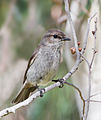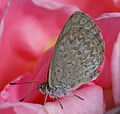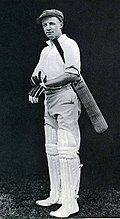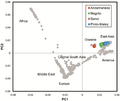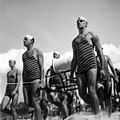Portal:Australia
| Showcase | Content | Interesting facts | Contributing |
Introduction

Australia, officially the Commonwealth of Australia, is a country comprising the mainland of the Australian continent, the island of Tasmania and numerous smaller islands. It has a total area of 7,688,287 km2 (2,968,464 sq mi), making it the sixth-largest country in the world and the largest in Oceania. Australia is the world's flattest and driest inhabited continent. It is a megadiverse country, and its size gives it a wide variety of landscapes and climates including deserts in the interior and tropical rainforests along the coast.
The ancestors of Aboriginal Australians began arriving from south-east Asia 50,000 to 65,000 years ago, during the last glacial period. By the time of British settlement, Aboriginal Australians spoke 250 distinct languages and had one of the oldest living cultures in the world. Australia's written history commenced with Dutch exploration of most of the coastline in the 17th century. British colonisation began in 1788 with the establishment of the penal colony of New South Wales. By the mid-19th century, most of the continent had been explored by European settlers and five additional self-governing British colonies were established, each gaining responsible government by 1890. The colonies federated in 1901, forming the Commonwealth of Australia. This continued a process of increasing autonomy from the United Kingdom, highlighted by the Statute of Westminster Adoption Act 1942, and culminating in the Australia Acts of 1986.
Australia is a federal parliamentary democracy and constitutional monarchy comprising six states and ten territories. Its population of almost 28 million is highly urbanised and heavily concentrated on the eastern seaboard. Canberra is the nation's capital, while its most populous cities are Sydney and Melbourne, both with a population of more than 5 million. Australia's culture is diverse, and the country has one of the highest foreign-born populations in the world. It has a highly developed economy and one of the highest per capita incomes globally. Its abundant natural resources and well-developed international trade relations are crucial to the country's economy. It ranks highly for quality of life, health, education, economic freedom, civil liberties and political rights.
Featured article -

Bodyline, also known as fast leg theory bowling, was a cricketing tactic devised by the English cricket team for their 1932–33 Ashes tour of Australia. It was designed to combat the extraordinary batting skill of Australia's leading batsman, Don Bradman. A bodyline delivery was one in which the cricket ball was bowled at pace, aimed at the body of the batsman in the expectation that when he defended himself with his bat, a resulting deflection could be caught by one of several fielders deliberately placed nearby on the leg side. (Full article...)
Selected biography -
Hilda Rix Nicholas (née Rix, later Wright, 1 September 1884 – 3 August 1961) was an Australian artist. Born in the Victorian city of Ballarat, she studied under a leading Australian Impressionist, Frederick McCubbin, at the National Gallery of Victoria Art School from 1902 to 1905 and was an early member of the Melbourne Society of Women Painters and Sculptors. Following the death of her father in 1907, Rix, her only sibling Elsie and her mother travelled to Europe where she undertook further study, first in London and then Paris. Her teachers during the period included John Hassall, Richard Emil Miller and Théophile Steinlen. (Full article...)
Did you know (auto-generated) -
- ... that the health of prisoners in Australia is impacted by their lack of access to Medicare, the country's otherwise-universal health care system?
- ... that George Jenkins was described in 1901 as "the happiest, proudest, most important and most worried individual" in Australia, but 90 years later as "a lazy, dictatorial, unctuous opportunist"?
- ... that Australia-born rugby union player Jason Jones-Hughes was the subject of a protracted legal battle over his international eligibility after Wales called him up for the 1999 Rugby World Cup?
- ... that the South Australian Labor politician Ernest Roberts served two tours in South Africa during the Second Boer War?
- ... that an Australian High Court case found a hotel chain to have used third-party contractors to avoid paying employees their required benefits?
- ... that Australian train driver Bill Morrow received the Soviet Union's Lenin Peace Prize alongside Fidel Castro?
- ... that when Australian Brihony Dawson debuted as the first non-binary host of reality TV franchise The Challenge, they decided not to imitate the "ominous" style of the U.S. host?
- ... that South Australian Labor premier Des Corcoran was mentioned in despatches for courage and skill in evacuating casualties during the Korean War?
In the news
- 31 March 2025 – Australia–North Korea relations
- The Royal Australian Air Force deploys a long-range maritime patrol aircraft P-8 Poseidon to Kadena Air Base in Okinawa Prefecture, Japan, to monitor North Korean maritime activities in the Yellow Sea, including weapons shipments prohibited under international sanctions. (NK News)
- 8 March 2025 – 2024–25 Australian region cyclone season
- Cyclone Alfred
- One person is confirmed killed and thirteen others are injured in floods caused by Cyclone Alfred as it passes through Queensland and New South Wales, Australia. (AP)
- 5 March 2025 – 2024–25 Australian region cyclone season
- Tropical Cyclone Alfred
- Queensland Premier David Crisafulli announces the suspension of public transport services and the closure of 640 schools in South East Queensland, Australia, as Cyclone Alfred is expected to make landfall early Friday morning local time. (ABC News Australia)
- 3 March 2025 – 2024–25 Australian region cyclone season
- Cyclone warnings are issued to residents of Brisbane, South East Queensland and the Northern Rivers region of New South Wales as Tropical Cyclone Alfred is expected to make landfall on Thursday or early Friday local time. (The Guardian Australia)
Selected pictures -
On this day
- 1787 – Charter of Justice signed providing the authority for the establishment of the first New South Wales Courts of Criminal and Civil Jurisdiction.
- 1844 – The first permanent synagogue in Australia opens in Sydney.
- 1845 – Ludwig Leichhardt discovers and names the Burdekin River.
- 1856 – South Australia introduces the secret ballot.
- 1905 – The Tasmanian General Post Office opens in Hobart, Tasmania.
- 1930 – Isaac Isaacs appointed as the third Chief Justice of Australia.
- 2005 – A Royal Australian Navy Westland Sea King helicopter crashes on the Indonesian island of Nias while providing humanitarian support.
General images
Topics
More portals
WikiProject
 |
 |

| |
Consider joining WikiProject Australia, a WikiProject dedicated to improving Wikipedia's coverage of topics related to Australia. The project page and its subpages contain suggestions on formatting and style of articles, which can be discussed at the project's notice board. To participate, simply add your name to the project members page.
As of 1 April 2025, there are 207,728 articles within the scope of WikiProject Australia, of which 598 are featured and 894 are good articles. This makes up 2.98% of the articles on Wikipedia, 5.28% of all featured articles and lists, and 2.16% of all good articles (see WP:AUSFG). Including non-article pages, such as talk pages, redirects, categories, etc., there are 415,456 pages in the project.
Associated Wikimedia
The following Wikimedia Foundation sister projects provide more on this subject:
-
Commons
Free media repository -
Wikibooks
Free textbooks and manuals -
Wikidata
Free knowledge base -
Wikinews
Free-content news -
Wikiquote
Collection of quotations -
Wikisource
Free-content library -
Wikiversity
Free learning tools -
Wikivoyage
Free travel guide -
Wiktionary
Dictionary and thesaurus



